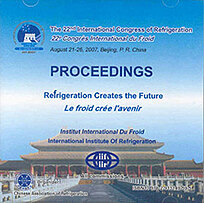
IIR document
A study on stability and thermal conductivity of nanofluid.
Author(s) : SHIN H. S., CHOI Y. M., HWANG Y., et al.
Summary
Nanofluid is a kind of new engineering material consisting of nanometer-sized particles dispersed in base fluid. In this study, various nanoparticles, such as MWCNT (multi-walled carbon nanotube), fullerene, copper oxide, and silicon dioxide have been used to produce nanofluids for enhancing thermal conductivity and lubricity. As base fluids, DI-water, ethylene glycol, and oil have been used. To investigate the thermo-physical properties of nanofluids, thermal conductivity has been measured. The experimental results of thermal conductivity of nanofluids are compared with the modelling results predicted by Jang and Choi model. The stability of nanofluid has been estimated with UV-vis spectrophotometer. Thermal conductivity of nanofluid has been increased with increasing volume fraction of nanoparticle except for water-based fullerene nanofluid which has lower thermal conductivity than that of base fluid due to its lower thermal conductivity, 0.4 W/mK. Stability of nanofluid has been influenced by the characteristics between base fluid and suspended nanoparticles.
Available documents
Format PDF
Pages: ICR07-B1-868
Available
Public price
20 €
Member price*
Free
* Best rate depending on membership category (see the detailed benefits of individual and corporate memberships).
Details
- Original title: A study on stability and thermal conductivity of nanofluid.
- Record ID : 2008-0217
- Languages: English
- Source: ICR 2007. Refrigeration Creates the Future. Proceedings of the 22nd IIR International Congress of Refrigeration.
- Publication date: 2007/07/21
Links
See other articles from the proceedings (839)
See the conference proceedings
Indexing
- Themes: Indirect refrigeration systems
- Keywords: Thermal conductivity; Ethylene glycol; Measurement; Particle; Oil; Secondary refrigerant; Water; Additive
-
Influence of SDBS (sodium dedecyl benzene sulfo...
- Author(s) : ZHU D. S., LI X. F., GAO J. W., et al.
- Date : 2007/07/21
- Languages : English
- Source: ICR 2007. Refrigeration Creates the Future. Proceedings of the 22nd IIR International Congress of Refrigeration.
- Formats : PDF
View record
-
Updating and extending secondary fluid data for...
- Author(s) : MELINDER Å.
- Date : 2006/05/29
- Languages : English
- Source: 7th IIR-Gustav Lorentzen Conference on Natural Working Fluids (GL2006). Proceedings
- Formats : PDF
View record
-
Pressure drop and heat transfer characteristics...
- Author(s) : LEE D. W., LEE S. M.
- Date : 2005/06/15
- Languages : English
- Source: Proceedings of the sixth Workshop on Ice Slurries of the IIR/Proceedings of the Second Conference on Phase Change Material and Slurry (PCM 2005).
- Formats : PDF
View record
-
Flow resistance and heat transfer reduction beh...
- Author(s) : HARUKI N., INABA H., HORIBE A.
- Date : 2007/08/21
- Languages : English
- Source: ICR 2007. Refrigeration Creates the Future. Proceedings of the 22nd IIR International Congress of Refrigeration.
- Formats : PDF
View record
-
Ice slurry formation based on nanofluid and hyd...
- Author(s) : WU P., ZHANG X. J., QIU L. M.
- Date : 2008/04/05
- Languages : English
- Source: Cryogenics and refrigeration. Proceedings of ICCR'2008.
View record
